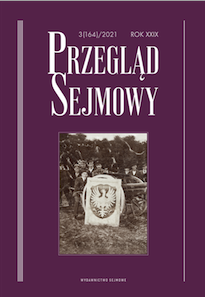Ograniczenia wolności kultu religijnego w czasie pandemii COVID-19: między konstytucyjnością a efektywnością
Restrictions on freedom of religious worship during the COVID-19 pandemic: between constitutionality and effectiveness
Author(s): Piotr StaniszSubject(s): Politics / Political Sciences, Law, Constitution, Jurisprudence, Theology and Religion
Published by: Kancelaria Sejmu
Keywords: COVID-19; epidemia; wolność uzewnętrzniania religii; wolność kultu; ograniczenia wolności i praw człowieka; stany nadzwyczajne
Summary/Abstract: The purpose of the present study is to analyse the restrictions on the freedom of religious worship introduced by the Polish executive authorities in the face of the spreading COVID-19 epidemic. The analysis aims to answer questions not only concerning the conformity of these actions with the Constitution of the Republic of Poland and statutory laws, but also pertaining to the issue of the level of preparation of Polish law for an epidemic. In reference to these questions, the author concludes that the introduction of restrictions on the freedom to manifest religion by acts of worship in the regulations issued by the Minister of Health and the Council of Ministers exceeds the bounds of statutory authorisation and is inconsistent with the Polish Constitution. According to the Constitution of the Republic of Poland, passing a law remains the only admissible way of introducing restrictions on the freedom of manifestation of religion, and there are no exceptions to this rule even in states of emergency. On the other hand, the author also points out that if the effectiveness of combating this kind of epidemic really depends on possibility of introducing the above-mentioned restrictions without a long legislative process, it means that Polish executive authorities have been confronted by the constitutional legislator and the legislature with a choice between being efficient and acting in conformity with the Constitution and statutory laws. Therefore, the article postulates that it is necessary to make deep changes to the current law. Elaborating a broad concept of these changes requires further analysis, and the relevant discussion needs to take into account the experience gained so far in combating the coronavirus epidemic, the importance of freedom of thought, conscience and religion, and the solutions adopted in other countries. A clear and balanced, as well as properly sequenced and democratically justified specification of the rules that should be followed by the executive when introducing restrictions related to the spread of the epidemic, even with regard to such important values as the freedom to manifest religion through acts of worship, is undoubtedly more appropriate than formally ruling out the possibility of taking action that may turn out necessary in the future
Journal: Przegląd Sejmowy
- Issue Year: 2021
- Issue No: 3
- Page Range: 143-165
- Page Count: 23
- Language: English, Polish

